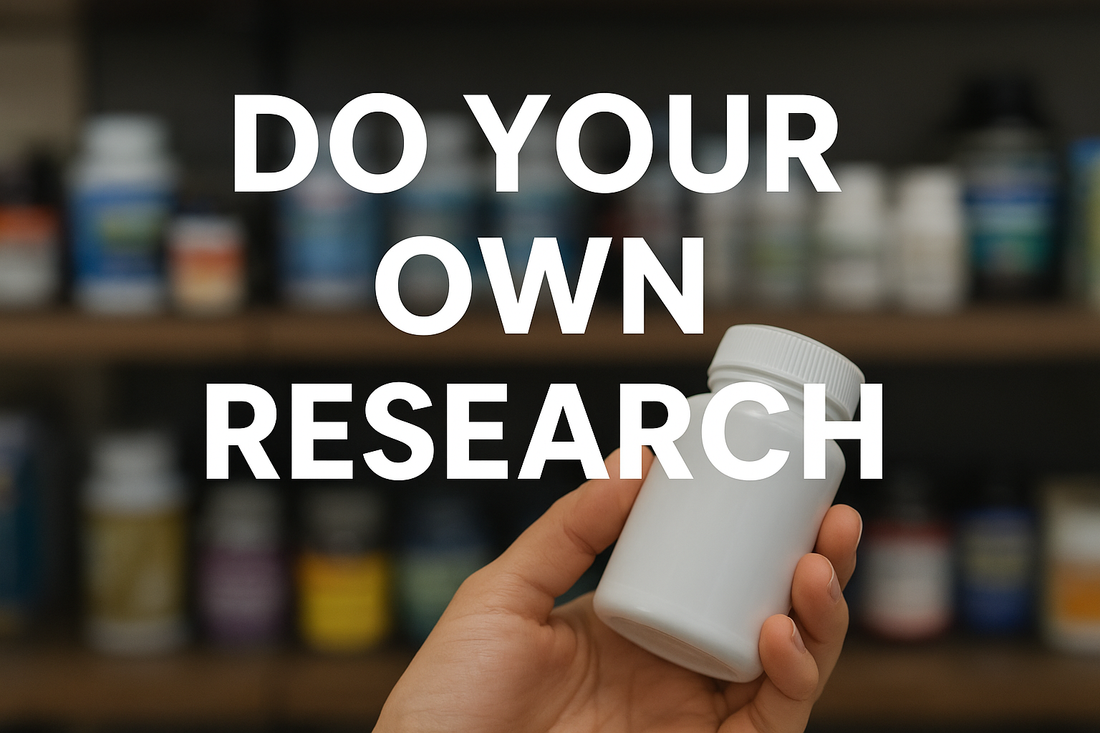
Do Your Own Research: Choosing Supplements with Confidence
Share
Walk into any health store—or scroll through an online marketplace—and you’ll see shelves of powders, pills, and capsules promising better sleep, sharper focus, stronger immunity, or faster recovery. Supplements can play a helpful role in health and performance, but they’re not all created equal. The truth is, some products are supported by strong science, while others are little more than marketing in a bottle. That’s why doing your own research is critical before putting anything in your body.
Why Research Matters
Unlike prescription medications, supplements are not always held to the same rigorous testing standards. This means:
- Labels may not always match what’s in the bottle.
- Claims may be exaggerated or not backed by solid data.
- Some ingredients can interact with medications or cause side effects.
Taking the time to research ensures you’re not wasting money—or risking your health—on something unproven or unsafe.
How to Find Trusted Data
1.
Look for Peer-Reviewed Studies
Google searches are a starting point, but not the finish line. Instead of relying on blog posts or social media “experts,” go to scientific databases:
- PubMed (pubmed.gov): A free database of medical research.
- Cochrane Library: Known for systematic reviews of clinical trials.
- Examine.com: A consumer-friendly site that summarizes supplement research with references.
When reading studies, pay attention to:
- Sample size (Was it 20 people or 2,000?)
- Population studied (Was it athletes, seniors, or mice?)
- Funding sources (Was the study funded by a supplement company?)
2.
Check Government and Health Organization Resources
Trusted institutions often provide unbiased fact sheets on supplements:
- National Institutes of Health Office of Dietary Supplements (ods.od.nih.gov)
- FDA (Food and Drug Administration) for warnings, recalls, and safety alerts.
- Mayo Clinic and Cleveland Clinic websites for plain-language explanations.
3.
Look for Third-Party Testing and Certification
Quality matters as much as ingredients. Look for seals of approval from organizations that test for purity and accuracy:
- USP (United States Pharmacopeia)
- NSF International
- ConsumerLab
These groups verify that the supplement contains what it claims, without hidden fillers or contaminants.
4.
Cross-Check Claims
If a brand says their product “boosts testosterone 300%” or “burns fat overnight,” ask:
- Where’s the published evidence?
- Is the claim based on human trials or lab tests in animals?
- Do multiple sources agree, or is it one outlier study?
Red flag: If the only evidence comes from the company’s own marketing, be skeptical.
5.
Talk to Professionals
While self-research is key, discussing supplements with a licensed healthcare provider or registered dietitian helps you catch potential risks, especially if you take medications or have health conditions.
Bottom Line
Your body deserves better than blind trust in flashy labels or social media hype. Doing your own research helps you separate fact from fiction, avoid scams, and find supplements that actually support your goals. Use trusted scientific sources, verify product quality, and stay skeptical of bold claims.
Supplements can be powerful tools—but only when you know exactly what you’re putting into your body.